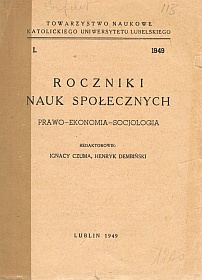Moralne podstawy ustroju Społeczności międzynarodowej
Abstrakt
From the fact that the aims the state is tending at are different from those the individual is serving, many people draw the conclusion that the State is not bound in its doings by any moral norms but only by the reason of state (raison d'etat). All state activities, however, are finally accomplished by individuals. Therefore, there is no reason why their moral responsibility should be absorbed by the alleged moral sovereignty of the state, in other words by the raison d’etat independent of all morality. In view of the exclusively temporal aims of the state individuals acting as its organs may be subject to other norms than those which bind them when they are acting on their own behalf. This does not mean, however, that the state and its organs stand „jenseits von Gut und Böse” (beyond good and wrong). There were periods in history, and the XlXth century is among them, when the raison d’etat ordered the states to act in accordance with the law. But the basis of a law are weak, if it is obeyed only as long as one ’ s interest requires such an obedience Attempts to enforce the law by means provided for in the Covenant of the League of Nations and the Charter of the U. N. O. could strengthen the law only, if the international force would prove really effective and if such organisations could exercise their influence for a sufficiently long time. More important, however, than the reform of the structure of the international community is the reform of human souls and human minds. Man must get used to seeing in the organs of the state human beings who bear a full moral responsibility for their acts even when accomplished on behalf of the State. This would mean to humanise the state and to bring a more humane note into the international relations. The Catholic Church has always put forward these demands and Catholics in all countries should be the first to grasp their meaning and to give them real force.
Copyright (c) 1949 Roczniki Nauk Społecznych

Utwór dostępny jest na licencji Creative Commons Uznanie autorstwa – Użycie niekomercyjne – Bez utworów zależnych 4.0 Międzynarodowe.


